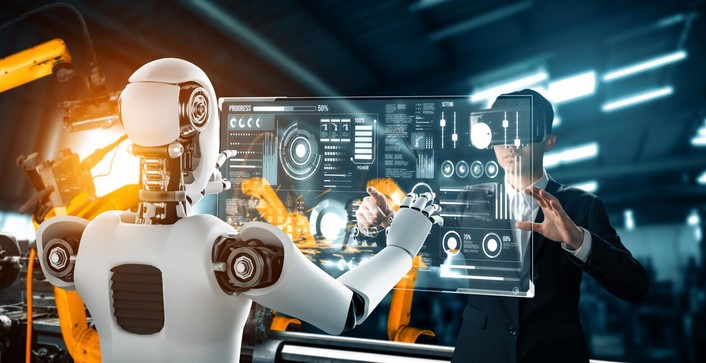
The rise of artificial intelligence (AI) has significantly reshaped various industries, and nowhere is its impact more transformative than in manufacturing. AI in manufacturing automation is revolutionizing the way factories operate, streamlining production processes, enhancing efficiency, and reducing human error. As industries strive for greater productivity and lower costs, AI-powered solutions have emerged as the driving force behind next-generation manufacturing. From predictive maintenance to automated quality control and optimized supply chains, AI is taking manufacturing to unprecedented levels of precision and innovation. In this article, we will explore how AI is driving the future of industry and its pivotal role in automating manufacturing processes.
1. The Role of AI in Manufacturing Automation
AI in manufacturing automation encompasses a wide range of technologies, from machine learning (ML) and robotics to computer vision and natural language processing (NLP). These technologies are integrated into production lines to make them smarter, more efficient, and more adaptable to changing demands. The key advantage of AI in manufacturing lies in its ability to analyze vast amounts of data in real time, enabling quicker decision-making and more accurate predictions.
a. Machine Learning and Predictive Maintenance
One of the most impactful applications of AI in manufacturing automation is predictive maintenance. Traditional maintenance systems rely on scheduled checks, which can result in unnecessary downtime or, conversely, fail to address issues until a machine breaks down. AI-driven predictive maintenance uses sensors and data analytics to monitor equipment in real-time and identify signs of wear or failure before they occur. By analyzing patterns in data, AI models can forecast when a machine will need maintenance, allowing manufacturers to schedule repairs only when necessary, minimizing downtime and extending the life of expensive equipment.
b. Robotic Process Automation (RPA)
Another significant advancement in manufacturing automation is the use of robotic process automation (RPA). Robots powered by AI can perform repetitive tasks that would otherwise require human intervention, such as assembling parts, packaging, and quality inspection. AI-equipped robots can adapt to changing workflows, handle multiple tasks simultaneously, and maintain high levels of precision, reducing human error and improving overall production efficiency. In addition, AI-driven robots can work in hazardous environments, reducing workplace injuries and ensuring worker safety.
2. Enhancing Efficiency and Quality Control with AI
AI’s role in manufacturing is not limited to automation alone; it also plays a crucial part in improving overall efficiency and product quality. By leveraging AI in manufacturing automation, companies can significantly reduce waste, optimize resources, and enhance quality control processes, ultimately leading to greater profitability and customer satisfaction.
a. Optimized Production Scheduling
AI systems can analyze historical production data, machine performance, and supply chain factors to optimize production schedules. This ensures that resources are used effectively, and production bottlenecks are minimized. AI-powered scheduling algorithms can dynamically adjust based on real-time factors, such as supply shortages or unexpected downtime, ensuring that production lines remain as efficient as possible. This level of optimization leads to reduced lead times, better inventory management, and ultimately more responsive manufacturing processes.
b. AI in Quality Control
Quality control is a critical aspect of any manufacturing process. Traditionally, it has been a manual task, often relying on human inspectors to identify defects and inconsistencies in the product. AI in manufacturing automation, particularly through the use of computer vision, allows for highly accurate and rapid quality control. AI-powered cameras and sensors can scan products at high speeds and with high precision to detect even the slightest deviations from quality standards. This allows manufacturers to catch defects early in the production process, ensuring that only top-quality products reach customers.
3. The Future of AI in Manufacturing Automation
As AI continues to evolve, its impact on manufacturing will only grow stronger. The future of AI in manufacturing automation holds the promise of even more advanced technologies, such as fully autonomous factories and highly customizable production lines, tailored to the unique needs of each customer.
a. Autonomous Factories and Smart Manufacturing
The concept of a fully autonomous factory, where AI manages every aspect of the manufacturing process from raw material procurement to final product delivery, is no longer a far-off dream. By integrating AI across all levels of production, including logistics, inventory management, and even design, manufacturers can create fully autonomous factories that require minimal human intervention. These smart factories will operate 24/7, continuously optimizing processes and responding to real-time changes in demand and supply.
AI-powered systems will also enable manufacturers to create highly flexible production lines capable of quickly adapting to the changing needs of customers. For example, AI can analyze customer preferences and market trends to adapt production runs, offering personalized products without the need for large-scale redesigns or retooling of machinery. This adaptability will lead to more efficient and cost-effective manufacturing, allowing companies to stay competitive in a rapidly changing marketplace.
b. AI-Driven Supply Chain Optimization
One of the most exciting prospects for AI in manufacturing is its role in optimizing the global supply chain. AI can predict demand fluctuations, analyze supplier performance, and forecast material shortages, allowing manufacturers to make informed decisions about sourcing and inventory. By integrating AI with blockchain and the Internet of Things (IoT), manufacturers can achieve end-to-end supply chain transparency, ensuring greater accuracy and reducing delays. This level of optimization will help manufacturers respond more quickly to market demands and streamline operations, further boosting profitability.
AI in manufacturing automation is rapidly transforming the industry by driving innovation, improving efficiency, and enhancing product quality. From predictive maintenance and robotic process automation to optimized production scheduling and advanced quality control, AI is enabling manufacturers to meet the demands of a fast-paced, competitive market. As AI continues to evolve, its role in shaping the future of manufacturing will only become more critical, paving the way for autonomous factories, personalized production, and highly efficient global supply chains. Manufacturers who embrace AI in manufacturing automation today will be well-positioned to lead in the industry tomorrow, gaining a competitive edge and delivering products that meet the highest standards of quality and efficiency.
